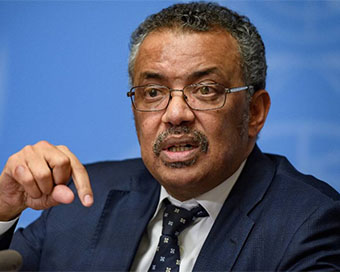Gallery
 PM Modi visit USA
PM Modi visit USA Only the mirror in my washroom and phone gallery see the crazy me : Sara Khan
Only the mirror in my washroom and phone gallery see the crazy me : Sara Khan Karnataka rain fury: Photos of flooded streets, uprooted trees
Karnataka rain fury: Photos of flooded streets, uprooted trees Cannes 2022: Deepika Padukone stuns at the French Riviera in Sabyasachi outfit
Cannes 2022: Deepika Padukone stuns at the French Riviera in Sabyasachi outfit Ranbir Kapoor And Alia Bhatt's Wedding Pics - Sealed With A Kiss
Ranbir Kapoor And Alia Bhatt's Wedding Pics - Sealed With A Kiss Oscars 2022: Every Academy Award Winner
Oscars 2022: Every Academy Award Winner Shane Warne (1969-2022): Australian cricket legend's life in pictures
Shane Warne (1969-2022): Australian cricket legend's life in pictures Photos: What Russia's invasion of Ukraine looks like on the ground
Photos: What Russia's invasion of Ukraine looks like on the ground Lata Mangeshkar (1929-2022): A pictorial tribute to the 'Nightingale of India'
Lata Mangeshkar (1929-2022): A pictorial tribute to the 'Nightingale of India' PM Modi unveils 216-feet tall Statue of Equality in Hyderabad (PHOTOS)
PM Modi unveils 216-feet tall Statue of Equality in Hyderabad (PHOTOS)The Badminton Association of India (BAI) has announced a 14-member-strong India squad for
- Men’s Sr Hockey Nationals to be played in division-based format from April 4
- Mensik denies Djokovic 100th title in Miami final
- KIPG: Son of a vegetable vendor, Bihar’s Jhandu Kumar eyes Worlds, 2028 Paralympics
- Hardik Singh credits hard work and team unity for receiving HI Midfielder of the Year award
- Djokovic, Alcaraz land in same half of Miami draw
Pandemic situation of indigenous American concerning: WHO Chief Last Updated : 21 Jul 2020 02:25:31 PM IST 
WHO Director-General Dr. Tedros Adhanom Ghebreyesus The chief of the World Health Organization (WHO) said that his organization is deeply concerned about the impact of COVID-19 on indigenous peoples in the Americas, the current epicenter of the pandemic.
WHO Director-General Dr. Tedros Adhanom Ghebreyesus told a virtual press conference on Monday that as of July 6, over 70,000 cases and more than 2,000 deaths have been reported among indigenous peoples in the Americas, Xinhua news agency reported."Most recently, at least 6 cases have been reported among the Nahua people, who live in the Peruvian Amazon," the WHO chief said.According to him, there are up to 500 million indigenous peoples worldwide in over 90 countries, who often have a high burden of poverty, unemployment, malnutrition and both communicable and non-communicable diseases, making them more vulnerable to COVID-19 and its severe outcomes.Dr. Tedros stressed that one of the key tools for suppressing transmission in indigenous communities, as well as other communities, is contact tracing."No country can get control of its epidemic if it doesn't know where the virus is," he noted.WHO's Regional Office for the Americas has recently published recommendations for preventing and responding to COVID-19 among indigenous peoples, and WHO is also working with the Coordinator of Indigenous Organizations of the Amazon River Basin to step up the fight against COVID-19, Tedros said.IANS Geneva For Latest Updates Please-
Join us on
Follow us on








172.31.16.186







